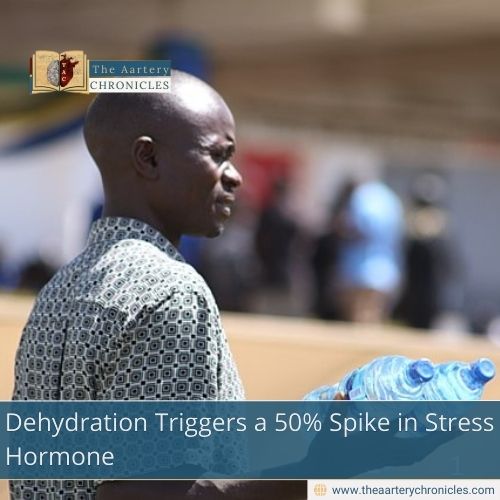

Dehydration Triggers a 50% Spike in Stress Hormone
Not drinking enough water may seem harmless, but new research shows it can place hidden stress on the body. A recent study from Liverpool John Moores University found that dehydration can increase stress hormone levels, raising cortisol by more than 50% in people who drank less than 1.5 litres of fluids daily compared to those who met hydration recommendations.
Cortisol, often called the body’s main “stress hormone,” is essential in short bursts, but when it stays high for too long, it is linked to serious health issues such as heart disease, diabetes, and depression. Interestingly, the study revealed that participants with lower water intake did not necessarily feel thirstier. Yet, their bodies showed signs of strain, proof that even mild dehydration can quietly impact both mental and physical health.
How Dehydration Amplifies Stress
Researchers used the Trier Social Stress Test, a standard experiment involving a mock job interview and mental math, to measure stress responses. While heart rate and self-reported anxiety levels appeared similar in both hydrated and under-hydrated groups, biological markers told a different story. Individuals with lower fluid intake experienced significantly higher cortisol spikes, indicating that dehydration exacerbates the body’s stress response.
The reason lies in vasopressin, a hormone that helps the body conserve water. When fluid levels drop, vasopressin signals the kidneys to retain water. However, it also stimulates the brain’s stress center—the hypothalamus, leading to extra cortisol release. This double effect means that even slight dehydration can amplify the stress response, making the body less resilient to everyday pressures.
Long-Term Health Risks of Under-Hydration
If dehydration continues over time and cortisol remains chronically elevated, the risks go beyond feeling stressed. Long-term high cortisol has been linked to:
- Cardiovascular disease (heart strain, high blood pressure)
- Metabolic conditions such as diabetes
- Mental health disorders, including anxiety and depression
The researchers highlight that drinking enough fluids, about 2 litres per day for women and 2.5 litres for men, is a simple but powerful way to lower stress reactivity and protect overall health. A practical way to check hydration status is by monitoring urine colour; a light yellow shade usually means adequate fluid balance.
Easy Tips to Stay Hydrated Daily
Staying hydrated doesn’t need to be complicated. Small, consistent steps can make a big difference:
- Carry a water bottle during work, travel, or stressful situations
- Sip water regularly instead of waiting until you feel thirsty
- Eat water-rich foods like fruits, vegetables, and soups
Even modest increases in fluid intake can help regulate cortisol levels, sharpen mental clarity, and ease the load on the heart and brain.
Conclusion
This new research makes it clear: dehydration can increase stress hormone levels and quietly strain both the mind and body. By keeping up with daily fluid needs, you not only prevent thirst but also give your heart, brain, and stress response system much-needed protection. Drinking water, therefore, is more than just a habit; it is a vital tool for long-term health and resilience.
Source: Inputs from various media Sources
I’m a pharmacist with a strong background in health sciences. I hold a BSc from Delhi University and a pharmacy degree from PDM University. I write articles and daily health news while interviewing doctors to bring you the latest insights. In my free time, you’ll find me at the gym or lost in a sci-fi novel.
- Priya Bairagi
- Health News and Updates,People Forum
- 27 September 2025
- 09:00








